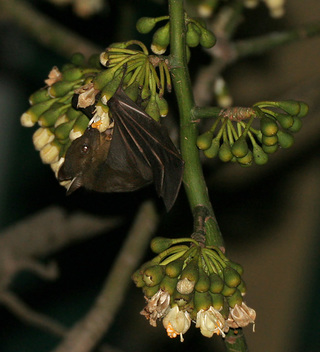
Greater short-nosed fruit bat
Order : Chiroptera
Family : Pteropodidae
Subfamily : Pteropodinae
Species : Cynopterus sphinx
The Greater short-nosed fruit bat, short-nosed indian fruit bat is listed as Least Concern (LR/lc), lowest risk. Does not qualify for a more at risk category. Widespread and abundant taxa are included in this category, on the IUCN Red List of Threatened Species
Namings for the greater shortnosed fruit bat
A young / baby of a greater shortnosed fruit bat is called a 'pup'. A greater shortnosed fruit bat group is called a 'colony or cloud'.Countries
Bhutan, Burma, Cambodia, China, India, Indonesia, Laos, Malaysia, Sri Lanka, Thailand and VietnamSome facts about the
Greater short-nosed fruit bat
Adult weight : 0.075 kg (0.165 lbs)
Maximum longevity : 10 years
Female maturity :150 days
Male maturity : 525 days
Gestation : 120 days
Weaning : 42 days
Litter size : 1
Litters per year : 2
Weight at birth : 0.011 kg (0.0242 lbs)
Weight at weaning : 0.025 kg (0.055 lbs)
Facts about the greater short-nosed fruit bat
Short-nosed fruit bat (Cynopterus sphinx) pollinating wild banana flower This short-nosed fruit bat (Cynopterus sphinx) is pollinating wild banana flowers in Thailand.
The bats also contribute to the mangrove: Short-nosed Fruit Bat (Cynopterus sphinx) is believed to be the only pollinator of key mangrove trees (Sonneratia).
The bats also contribute to the mangrove: Short-nosed Fruit Bat (Cynopterus sphinx) is believed to be the only pollinator of key mangrove trees (Sonneratia)"(Singapore Zoological Gardens Docents, 2000). (Full text)
More animals beginning with G
